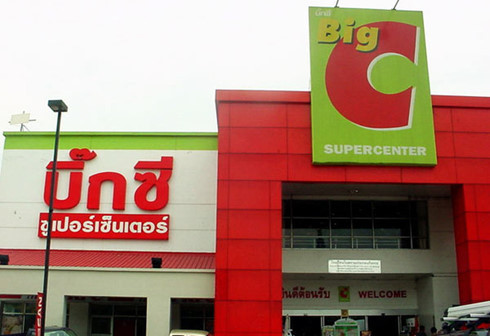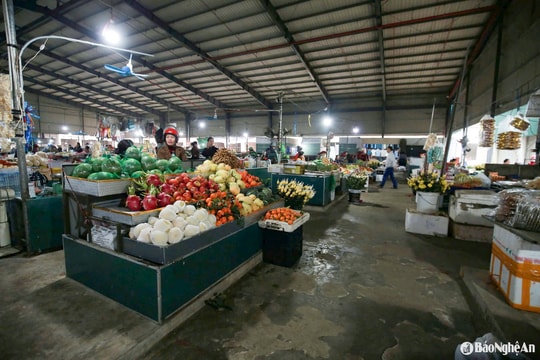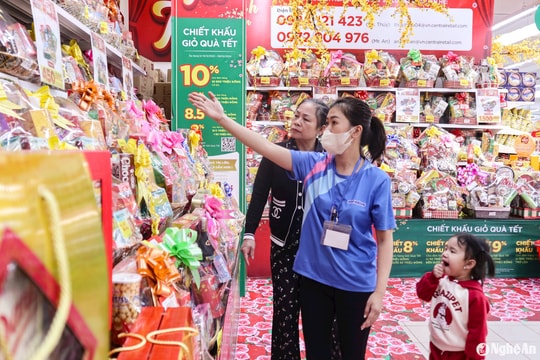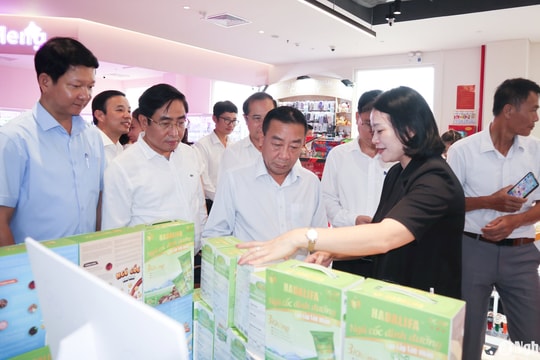Big C falls into Thai hands, where do Vietnamese goods go?
Big C falling into the hands of Thai people will benefit Vietnamese consumers, but the Vietnamese economy and businesses will face many difficulties and struggles in the new game.
One after another, Vietnamese wholesale and retail supermarkets have fallen into the hands of Thais, such as the acquisition of Metro, Nguyen Kim, or most recently Big C. According to economic experts, at first Vietnamese consumers will benefit, but the Vietnamese economy and businesses will face many difficulties and struggles in this new game.
M&A is the fear of Vietnamese businesses!
According to economic expert Pham Chi Lan: "Retail businesses are a fear of many businesses because right after they are happy to receive large sums of money, big technology and modern management skills, they are afraid that they will be taken over."
 |
| Big C falls into the hands of a Thai owner. After this successful acquisition, where will Vietnamese goods go? |
Not only retail, Thai giants also have a very methodical strategy to penetrate the Vietnamese market: product marketing, quality advertising, participating in distribution, taking over this field and directly manufacturing in Vietnam.
According to the General Statistics Office, in 2015, Vietnam spent 8.3 billion USD importing Thai goods, while the import volume also reached 7.1 billion USD; in the first quarter of 2016, the import turnover from Thailand also increased by 1.8 billion USD. In the two-way trade balance, Vietnam has always had a trade deficit with Thailand since 2010.
The General Department of Customs said that Vietnam's imported goods from Thailand are diverse, ranging from vegetables and fruits to consumer goods, electronics to high-value products such as automobiles. In 2015, all kinds of automobiles (trucks, passenger cars, coaches, specialized vehicles) imported from China to Vietnam accounted for 26,700 units, Korean cars were more than 26,500 units, and Thai cars also reached 25,000 units.
In the first quarter of 2016, Thai cars dominated Korean and Chinese cars when imported to Vietnam with 7,800 cars compared to 3,560 cars from Korea and 2,260 cars from China. What is quite special about Thai enterprises is that they limit direct investment, replacing it with indirect investment, reducing risks.
Ms. Vu Kim Hanh, Chairwoman of the Association of High-Quality Vietnamese Goods Enterprises, said: "It is not difficult to calculate that foreign corporations have taken up 50% of the Vietnamese retail market. I think from today, it can be said that Vietnam has reached the milestone of... losing most of the retail market. More importantly, Vietnamese enterprises will face many new challenges, many more difficulties. Consumers initially benefit, but production and the economy will gradually understand that distribution determines production. I understand what the Central management agency has done and will do. But I am really worried.
“People are asking whether foreign retail is beneficial or disadvantageous for Vietnam. I think these are two aspects of a problem that every country faces,” said Ms. Hanh.
Economic expert Le Dang Doanh also said: “The trend of association and opening up is inevitable for any country. Vietnam is a country that has integrated late, so it has a huge retail market potential, with a market value of billions of dollars being exposed for capitalists and corporate sharks to look at.
But the disadvantage is, why do the world's leading retailers give up the best and most beautiful locations to Thai investors? Are Metro or BigC losing money? There are many market advantages but it is difficult to take advantage of and exploit....".
Retail value is running out of room for domestic businesses!
In fact, domestic retail is forming two types: modern retail and traditional retail. Modern retail is concentrated in supermarkets, shopping malls and convenience stores, specialized. Traditional retail is markets, small retail stores. The value of modern retail market is accounting for 25% of the market value, more than 75% belongs to other channels, however, the value of modern retail is increasing rapidly due to the urbanization and industrialization process in Vietnam.
Mr. Doanh affirmed: “A series of foreign retail enterprises sold themselves to Thai owners, most of which are the leading retail enterprises in Vietnam. This is a normal thing in investment and business of later developed economies, but it will be unusual in competition and market for these countries…
In the agreements between capitalists, the strategic story of market penetration will be discussed. Here, Metro and BigC are the largest retail giants in Vietnam. Big C has 32 distribution points, in addition, they also have prime business locations in major cities and localities. Thus, the advantage of acquisition is not only in retail, they also contribute to promoting and capturing the image in the hearts of Vietnamese consumers.
According to Mr. Vu Vinh Phu, Chairman of the Hanoi Supermarket Association: “All countries consider the domestic market as their home ground, their fulcrum, and export as their weapon for development. However, in Vietnam, enterprises focus mainly on export.
"While they have not been successful in exporting because Vietnamese products are still exported raw to other countries to process into products with different packaging and brands, in the domestic market, Vietnamese enterprises have lost, or more accurately, abandoned, the domestic market because: the market share value is small, the potential is not great," Mr. Phu commented.
According to the Chairman of the Hanoi Supermarket Association, foreign importers have a mechanism to find products that have a domestic market and a certain market share before importing. If you have nothing in hand, you will only accept selling raw products. On the other hand, Mr. Phu also stated the reason: "In reality, foreign retail enterprises are given priority and better positions than domestic retail enterprises. Why? Because local authorities always "favor" and "like" FDI instead of the sparse domestic retail projects.
"It takes Vietnamese retailers at least three months to apply for land to build a project, but a foreign company only takes one month. They have money and power, so they have the upper hand. Therefore, all business opportunities are lost and the competition becomes unequal," said Mr. Phu.
For his part, economic expert Le Dang Doanh said: "Many people say that Thai retail corporations are not strong or large, but if compared, they are only compared to Korean and Japanese retailers. As for Vietnamese retail, they are far superior to us. Thai retail enterprises are very strong, they dominate many retail markets in Singapore, Malaysia, Indonesia, the Philippines and recently Vietnam. Thai people penetrate Vietnam very systematically, there are cases where project directors go to study Vietnamese to communicate with Vietnamese traders. Every year, Thai people open 1-3 consumer goods fairs in Hanoi and Ho Chi Minh City.
Thai people bring goods into Vietnam in all aspects: hand-carried goods, retail goods through agents, border trade goods, and goods exported to supermarkets. Now, in addition to the massive Thai store system opening in big cities, mini supermarkets and hypermarkets are in the hands of Thai people.
According to VOV
| RELATED NEWS |
|---|

.jpg)



.jpg)

.jpg)
